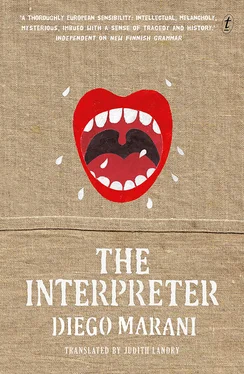One Sunday I went back to the city earlier than usual; the sky had turned leaden, and a sharp east wind was blowing branches and rubbish up onto the beach. Soon it began to snow; the frozen flakes mingled with the sand, whistling among the brushwood; I sought refuge in the bus, which was waiting at the bus stop. The driver was asleep and was not best pleased when I knocked on the door to ask him to let me in. The city, when we reached it, was sunk in snow, the whiteness of the streets marred only by the odd tyre mark; I went back to the hotel but hesitated to go up to my room for fear of loneliness. At least there were people in the foyer, the waiters were chatting to each other and a group had just gathered in the bar, drinking beer and laughing uproariously; I lingered among the armchairs, uncertain as to what to do, when I found myself in front of a man wearing a sailor’s cap, holding out a strip of cardboard bearing the words ‘Stauber — Geneva’. I stared at it, intrigued by the coincidence. The man came up to me.
‘Are you Gunther Stauber, the interpreter?’ he asked me in strongly accented French. I jumped, then looked around me in alarm.
‘That’s me!’ I replied firmly, without any idea as to what prompted this reply.
‘They’re waiting for you down at the harbour; after you’ve seen them, I’ll bring you back to the hotel,’ the sailor said, leading the way. We got into a car and made our way towards an outlying part of town strewn with abandoned antenna towers, half-built hangars and ugly, peeling blocks of flats; piles of snow were building up in odd corners and blinding slivers of ice hung over the drains at the edges of the pavement. Then, at the end of the road, the sea came into view, dark, rough and flecked with foam. The sailor led me to a pier where a French merchant ship was berthed, the Saint-Nazaire ; an officer came towards me from the deck and took me into the control room, out of the wind. We shook hands.
‘Welcome on board, Mr Stauber. I am Delattre, Captain Jacques Delattre. Above all, first I would like to thank you for agreeing to come to our aid. I must admit, when I first turned to the Red Cross, I wasn’t at all hopeful; conditions being what they are, I couldn’t see what they could do. But I’ve known Admiral Van Wijlen since naval college; we haven’t often met in recent years, but we’ve stayed in contact. He promised me he would take a personal interest in the matter, and he’s always been a man of his word. He’d spoken to me on the phone about a well-known interpreter, a top-grade functionary in some important Geneva-based international organisation and an expert in Asiatic languages whom he knew personally. A little less than a week ago, he cabled me to tell me that he had been transferred to Odessa. I’m happy to have you among us; even if, at this juncture, I’m not sure that even an expert like yourself can be of much use to us!’
Without the faintest idea of what he was talking about, I nodded, beginning to fear that I had got myself into something of a pickle.
‘I don’t know if you are au courant ,’ he said, clasping his hands behind his back and glancing at the sailor, who shook his head.
‘I’m not au courant with anything; I only knew that someone from the Saint-Nazaire would be getting in touch with me,’ I lied.
‘Well, then, let’s go downstairs,’ the Frenchman said, following the sailor to the companionway.
‘You see, it’s a strange business, one to be handled with care — we might find ourselves in trouble with the Ukrainian authorities. But it isn’t an isolated phenomenon, either,’ he went on as we walked. We came to a corridor lit by small lights screwed into the ceiling, then stopped in front of a cabin door.
‘They’ve put him in here for the moment, but we found him in the hold where the timber is stored. He looked more animal than human — he was wearing just a filthy overall and his feet were bound up in rags tied up with wire. The nurse has given him a tranquilliser, so he may be a bit confused. We tried asking him who he was, but he just answered in that incomprehensible gibberish of his, and that was when I called in Van Wiljen — we need someone who knows the languages spoken in Siberia, which is where we imagine this man comes from. We ply a route between Nahodka and Marseilles, taking machinery to Siberia and coming back through South-East Asia laden with tropical timber, calling in at Odessa where we sell some of our teak, and that’s where we discovered him. But Nahodka is the only place where he could have come on board.’
The captain gave me a serious look and placed his hands on the handle of the cabin door.
‘The worrying thing about all this, you see, is that he’s the fourth man we have found in our hold in as many months; it can’t be pure coincidence. We want to know who these individuals are, where they come from and what they are looking for on our ship; perhaps they are being sent by someone; perhaps, without knowing it, we’re being made a third party in some illicit trafficking,’ he added before sharply turning the handle of the cabin door.
The midget of a man lying on a camp bed, in the glare of a neon strip, had eastern features and a mad look in his eyes; upon our entry he shook his head and gave us a wide-eyed stare. The captain and the sailor shuffled towards the back of the cabin and waited for me to speak. I would have to enter into the spirit of the thing and come up with some fabrication, so I addressed some words of gibberish to him, surprised by the ease with which I did so. Hearing my words, he frowned; I came out with another string of nonsense, which might have approximated a run-down of my stay in Dr Barnung’s clinic: fragments of the Esperanto text which Kwiatkowski had tried to have me learn, something of what I could remember of Seroa, a bit of Navajo and Vassilenko’s Urdu. Behind my back, the captain and the sailor listened in awed silence. After observing me at length, the man sat up, licked his lips, opened his mouth and began to speak. Then it was my turn to be dumbfounded: for a moment, I thought that it was the interpreter that I was dealing with. The man began to whistle and whimper and quack in just the same way as the interpreter had done, emptying his lungs to emit volleys of clicking sounds, then whistling again, but from his throat, modulating the sound until finally it became one heartfelt, pleading wail. Then he fell silent and lay down again, gazing at the ceiling with blank, staring eyes; at that moment some mysterious inner power took possession of my breathing and I too began to whistle, whimper and quack in precisely the same way as he himself had done, noting, even as I did so, that my rantings were strangely like his own. The whole thing lasted just a few seconds. Now the madman was looking at me, and he seemed suddenly to have become more aware of his surroundings; he began to bang his head on the pillow, twisting it from side to side, howling and clutching the bedframe with his hands. The sailor rushed up to the bed, slipped a leather thong around his torso and pinned him down, then used another to immobilise his legs; he took a syringe from a case he had in his pocket and injected the contents of a yellowish phial into a vein; the man soon quietened down.
The captain slipped out of the cabin and gestured to me to do likewise.
‘Did you manage to catch anything?’ he asked me anxiously.
‘I must admit, I didn’t. I don’t know his language — if language is the word. I tried speaking to him in Tungusic and asked him a few questions in Urdu, but he didn’t seem to react. Perhaps he’s just deranged,’ I added airily, amazed at my own cool-headedness.
‘Yes, just like the other three! I too am beginning to think that this isn’t some foreign language, just simple madness. It’s rather alarming to think that all the madmen of Siberia have got their eye on my ship!’ Delattre agreed with a worried frown.
Читать дальше












